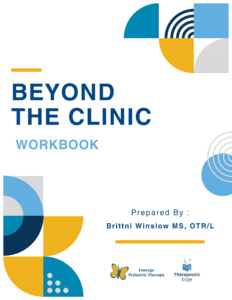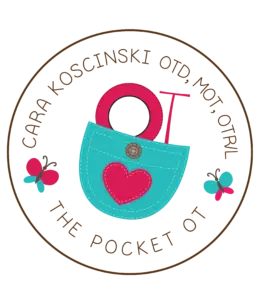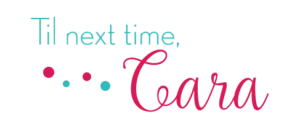
Occupational therapy is growing by leaps and bounds and it’s a beautiful thing! As an educator, I see how excited students are about entering OT. There’s also no shortage of children awaiting much-needed services. Therapists show how beautiful it is to use play-based therapy to boost skills.
BUT, with more children needing our skilled services we are becoming more stressed and overworked. Productivity standards are causing burnout in OTs in ALL settings.
 Remember that we can make small changes that make a BIG difference. Here are a few ‘Out of the Pocket‘ tips:
Remember that we can make small changes that make a BIG difference. Here are a few ‘Out of the Pocket‘ tips:
#1 Create a routine for every session – from day one. Everyone craves routine. In my practice, every session has a consistent schedule. This helps me and my students. For example, I ask kids to ‘sign in.’ Believe it or not, many children with severe deficits don’t get practice with signing their name! My own 18-year-old son needs to practice often. Then remove shoes and review the schedule. Keep on the schedule as much as possible. In the end, leave 5 minutes to review the session with caregivers. Routines can boost productivity as they keep everyone on track. If you’re not a routine-based OT, begin by creating a clear visual schedule in your clinic and follow it.
#2 Practice on-the-spot documentation, also called point of service documentation. PLEASE begin doing this if you’re not already. Here’s a brief story…….when I was a new OT, I was working in a rehab. unit. Our productivity standards were high and pressure was on. The problem was, other therapists were leaving on time and I ended up staying an extra HOUR or TWO writing my reports and notes. This continued for over a year! What did the other therapists know that I didn’t?
They documented during their sessions. While the patient was taking a rest break or doing a therapeutic activity designed to boost independence, they wrote in the chart or on the computer! COMPANIES and OTs DO NOT GET PAID for documentation time. It’s critical to build it into your session.
How to begin? Immediately take note of brief times you do more talking than is necessary or have a few extra moments while your student is engaged in a therapeutic activity. Look for patterns and opportunities to document.
#3 Plan sessions ahead of time. When I began my private practice I spent time during each session trying to come up with fun activities. Over the years, I created a weekly plan that could be easily adapted for each child. This plan is now available for EVERYONE! I purchased kid-friendly clip art, programs, hired graphic designers, and spent so much time but it worked.
The eBook is an IMMEDIATE download and can be used right after purchase. It’s over 2000 pages of activities in PDF form organized into gross motor, fine motor, sensory, cognitive, VP/VP, with tips and directions for activities.
#4 Know your state laws and the AOTA Code of Ethics. It’s YOUR license and you worked hard for it! The AOTA has a Code of Ethics that’s free to non-members. Ultimately, you are responsible for your own license and ethical responsibilities are important. The AOTA also has helpful free resources on productivity. Many of them are designed for Skilled Nursing Facilities but they are quite helpful for all settings. Oftentimes, supervisors are not OTs and are from a different discipline or have business backgrounds. Protect your license!
For more occupational therapy tips, read our earlier post on 5 Questions Asked by Occupational Therapists.
#5 Accurate billing will ALWAYS be more important than productivity numbers. We are NOT called to be machines. We are caring therapists whose priority is the CHILD/caregiver. I often tell my therapists, that it’s criminal action to fraudulently bill but not a crime to have decreased productivity. Be sure you can justify WHY you billed for a certain number of minutes. If you are ever questioned by insurance companies, your notes should show WHY your skilled services were required.
Document accurately and show WHY skillled services were needed.
Please tell us your tips by commenting below.



